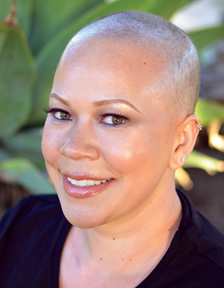With one touch last summer, what was just another day in the life of a Trojan graduate student suddenly became something much more.
“It was the third day of school and I was in class, touching my neck,” recalled Caryn Roach, a student in the entry-level professional program of the USC Division of Occupational Science and Occupational Therapy. “And I felt a big lump.”
When you’re a 30-something student enrolled in the nation’s top-ranked occupational therapy graduate educational program with a bright career ahead of you in a workforce market booming with employer demand, “lump” is the last word you expect to hear, let alone feel.
Soon after, Roach received her diagnosis — Hodgkin’s lymphoma, a type of blood cancer — and she began treatments under the care of Keck School of Medicine of USC faculty oncologists.
With cheery optimism characteristic of many occupational therapists, Roach focused on the positive aspects of her circumstances.
“It’s not perfect,” she said, but “I’m here at USC, and I automatically get a good doctor. My mom’s like, ‘You’re getting your tuition’s worth.’ It’s been the best experience for what it could have been.”
Roach also has a second family — the USC Trojan Family — that would soon be supporting her.
“I’m not lucky that I got cancer, but I think I’m very lucky with the timing of getting cancer,” she said. “I’m at USC. I’m in occupational therapy. I’m surrounded by very caring and supportive people, my classmates and all of the faculty.”
In late November, her classmates rallied around her. Because hair loss is perhaps the most obvious side effect of cancer treatments, Roach decided to just go ahead with shaving her hair and began wearing a decorative scarf on her head.
In a touching display of solidarity, the entire second-year master’s class organized “Scarf and Hat Day” in response. More than 100 students arrived at school wearing some form of headdress, including beanies and ball caps. Together they posed for a picture at Harry and Celesta Pappas Quad. Front and center was Roach, flexing her biceps and smiling widely.
Roach said that emotional support was not only a gesture to her but a broader reflection of the empathy at the heart of USC occupational therapists, present and future.
“It makes me feel good, and I know that it makes other people feel proud to be a part of this group. Knowing that we’re going to go out, and we’re going to go be OTs, and we’re going to help people make their lives better,” she said. “It just feels good to be a part of that. I don’t know where else you can find a group of that many people that are so caring and so supportive in one place.”
In March, Roach finished her last scheduled treatment. With more surveillance testing ahead of her, she is technically not yet in remission. But she is already looking forward to ways of leveraging her experience to benefit others in need.
Roach also recently decided to pursue her Doctorate of Occupational Therapy, accepting a clinical residency at the Keck Medical Center of USC with the hopes of working one-on-one with people with cancer.
“I don’t think a lot of people are getting occupational therapy, who have cancer. This is somewhere I can give my input, and it means something. I am here. I’m living it right now,” she said with an unmistakable air of gratitude. “I feel like a cliché, but I think that’s where I need to be because that’s where I can really help people.”


